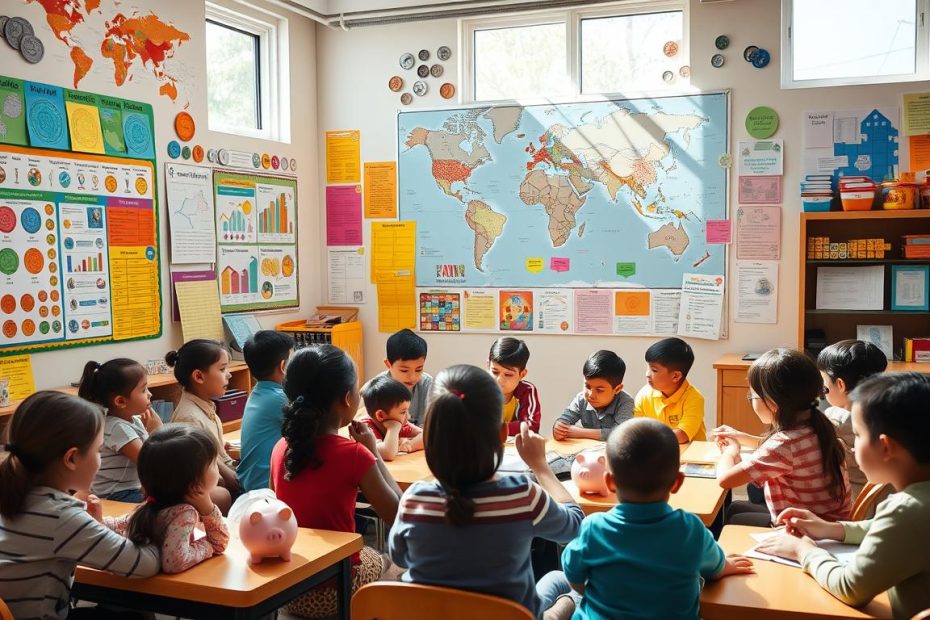Learning to manage money is crucial, and we must emphasize financial education for children. An early start in financial education can greatly influence a child’s future decisions. This includes encouraging savings and avoiding too much debt from the start. Research shows that kids who learn about money early on tend to be more financially responsible adults.
Teaching kids about money management using hands-on methods is effective. This includes things like visual savings trackers and realistic savings goals. Experts like Alejandro Cabezut and Mike Zisa highlight the need for integrating financial lessons early on. Financial planners, including Kara Harmon, stress teaching kids the difference between needs and wants.
Groups such as the JumpStart Coalition for Financial Literacy support this idea. Research from companies like Capital One agrees. Financial education for children helps them make smart choices. These choices lead to financial independence and stability in their lives.
The Significance of Financial Education for Children
The finance world is always changing. This makes youth financial education programs more important than ever. Teaching money skills for kids early on sets them up for personal and economic success. Studies show that kids taught about money grow up to handle finances better.
Many adults struggle with financial independence. This highlights the need for financial literacy in schools. For instance, while 77% of Americans have a credit card, 28% lack retirement savings. This shows a gap in financial planning knowledge.
Building a Foundation for Future Financial Success
It’s vital to teach kids about saving, credit, and budgeting early. An alarming 88% feel high schools didn’t prepare them for real-life money management. This underscores the need for financial education for children from a young age.
The Long-Term Impact of Financial Literacy
Youth financial education programs improve personal and economic stability. Knowledge about investments, like ETFs and bonds, helps young people boost the economy. With 60% of people over 65 in debt, early financial education is crucial.
Starting financial literacy young helps create informed, skilled adults. These adults manage their money well and positively impact the economy.
Timing and Techniques: Introducing Kids to Money Concepts
The journey of teaching financial literacy to kids starts by finding the right time. It uses techniques that make sense for their growing minds. Generally, starting as early as when kids show interest in money is best.

Age-Appropriate Financial Lessons
By 6 years old, children can grasp simple financial ideas. It’s a good time to teach them about kids money management. They learn to identify coins and their values. By 8, they’re ready for simple buying and selling and managing small allowances. Teaching them to save and the basics of making a budget is key at this stage.
Playful Learning: Games and Role-Playing
Play is a great way to teach kids about money. With role-playing games, kids can pretend to buy things or run a store. This lets them see how money works in a fun setting. They make financial choices and see results without real loss.
This method is fun and builds important money skills for life.
The main goal is for kids to learn and know how to handle money well. This prepares them for a stable and smart financial future.
Money Skills for Kids: Making Saving Second Nature
To raise financially smart kids, start by making savings as basic as brushing teeth or tying shoes. Teaching them to put money aside regularly helps them learn money’s value and the idea of waiting for rewards. Kids financial workshops offer special lessons suited for different ages.
By age three, kids can start learning about saving with simple things like a colorful piggy bank. These items make saving goals clear and fun. Every coin or bill they save feels like a win. It shows them the real outcome of their saving efforts.
Research from the UK government shows kids form core money skills by seven years old. Early financial habits are crucial. Talking about money often and joining kids financial workshops help kids see how savings grow. It puts them on the road to smart money choices.
Parents can also help by tying pocket money to chores. This teaches kids that money is earned. Experts suggest starting “long-term” savings at about age nine. This helps kids learn to save for later, not just for now.
The aim is to raise children who are good at saving and giving. Teaching them to save and engaging them in workshops builds a foundation. It prepares them for making wise financial choices their whole lives.
Financial Education Games for Kids: Learning Through Play
Teaching kids about money early on is super important. A variety of financial education games for kids makes this both fun and educational. These games are in English and Spanish and help with kids money management.
Games like Money Bingo and Dolphin Feed are great for kids in grades K-5. They make learning about money fun. For those in middle school, there’s Financial Football from Visa’s Practical Money initiative. It mixes football excitement with learning about money.
High schoolers get to tackle more complex money matters. Games like Get a Life and The Stock Market Game simulate real financial decisions. One amazing game even gives away $125,000 in scholarship money. These games aren’t just for learning; they can change lives.
These games aim to build solid financial understanding at crucial learning stages. They cover everything from basic budgeting to managing investments over 20 years. Such games play a key role in reducing the 72% of students stressed about money.
Adding these games to school lessons across the U.S. shows a big push for early financial literacy. It readies kids for handling money wisely in the future. It also helps combat adult financial literacy decline, promising a financially smarter future generation.
Financial Education for Children: More Than Just Piggy Banks
Teaching kids about children and money management is key in today’s world. Understanding money can help with long-term success. It’s more than saving money. It includes spending wisely, investing, and using credit the right way. Authors like Maya Corbic teach these concepts in books and kids financial workshops.
Learning to manage money starts with smart spending. Giving kids an allowance lets them see how spending choices matter. They learn about money by being in charge of some. This teaches them the value of planning ahead.
Promoting Wise Spending Habits
Lessons should link to things kids care about, like saving for something they want. For example, saving for an electric guitar can make a kid excited to save money. It makes learning about money fun and relevant.
Understanding Credit and Debt from a Young Age
Credit can seem complex to kids, but it’s important they understand it. Early lessons can explain how borrowing works. They should learn to borrow wisely to avoid debt problems. Talking about real-life examples can help them understand better. This prepares them for handling debt wisely later on.
In conclusion, kids financial workshops and books by experts like Maya Corbic are crucial. They provide a strong foundation in children and money management. This education helps prepare kids for financial independence and making smart money choices in the future.
Engaging Youth Financial Education Programs
Amid growing concerns about financial literacy, youth financial education programs are key in shaping the economic futures of young people. These aren’t just extra classes. They are vital lessons that turn complex financial ideas into something young people can understand and use.
At the heart of kids financial workshops, kids learn about budgeting, investing, and how credit works through fun activities. Each part of the workshop is carefully put together. It matches school learning goals and life outside school, making sure kids get the most from it.
The workshops are exciting, using digital tools like $martpath. Kids watch videos, play interactive games, and answer questions that make them think. The mix of digital media really pulls kids in. It’s even more engaging because the stories and characters come from all kinds of backgrounds.
Teachers say these youth financial education programs make a big difference. After the workshops, students get better at understanding complex financial ideas. They learn everything from how to save money to understanding credit scores and investing.
These programs fill a big gap in education. Only a few students learn about finance in school. By including these lessons in school, kids financial workshops give students the knowledge and confidence to handle money wisely. This doesn’t just help them in school. It prepares them for a financially healthy future.
Conclusion
Teaching kids about money is vital for their well-being and independence. Parents and educators play a key role. They help kids understand money management early on. This builds a strong foundation for smart choices later, like budgeting.
Studies show early financial literacy leads to fewer debts and higher savings later in life. It also means using credit wisely. So, learning about finances early is very beneficial for kids.
Financial education aims to prepare young people for a future where being smart about money means freedom and security. Every child, no matter their background, deserves to learn this. It helps lessen financial inequality.
Parents, guardians, and teachers are crucial in this learning process. They guide children in becoming confident and smart about finances. This includes developing emotional intelligence around money matters.
Investing in financial education for kids pays off. It leads to prosperity for people from all walks of life. Ongoing studies help improve teaching methods for better financial understanding.
These efforts today help prepare kids for a better economic future. We’re teaching them not just about money, but how to build responsible lives. The economic world is changing fast, and they need to be ready.


